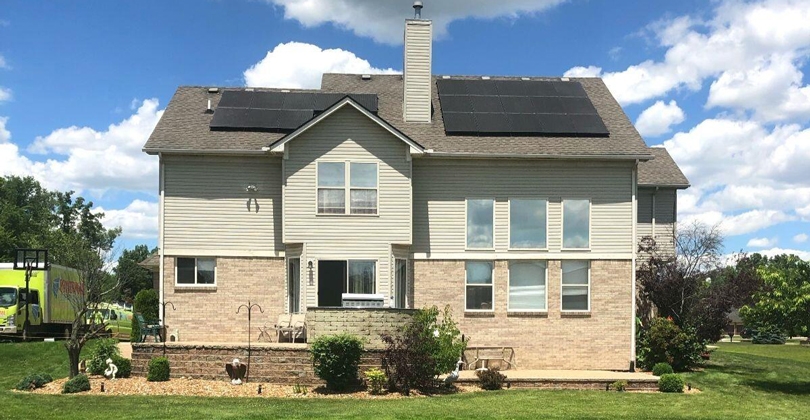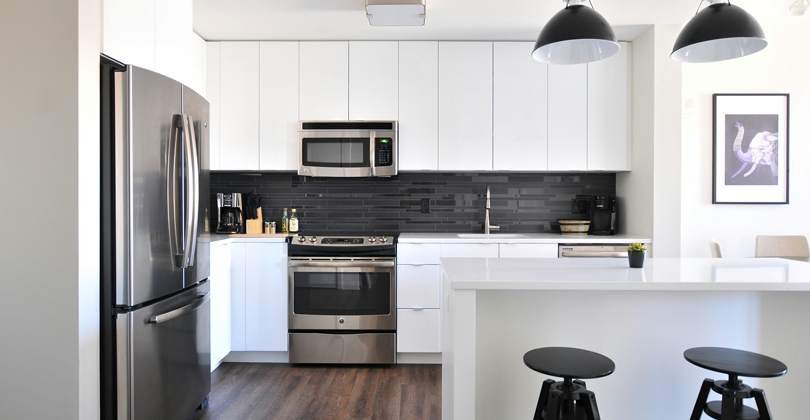When thinking about adding solar panels at your home, the first question you may ask yourself is: How many solar panels will I need to power my home?
Simply put, it depends. Solar panels are not a one-size-fits-all solution, and the amount of panels you need depends on a wide variety of circumstances.
To help you estimate how many panels you could need to potentially save money on your monthly electric bills, consider the factors below.
Your Home Size
To estimate how many solar panels you could need, it’s important to consider the size of your home. Consult the table below for a general range of the amount of solar panels you could need to potentially save money based on home size.
| Size of Home | Average Energy Consumption Per Month (in kWh) | *Amount of Panels Needed |
| 1500 sq. feet | 633 kWh | 14-17 |
| 2000 sq. feet | 967 kWh | 19-25 |
| 2500 sq. feet | 1,023 kWh | 24-30 |
| 3000 sq. feet | 1,185 kWh | 27-38 |
*Numbers shown in the table above are merely estimates based on data from the Residential Energy Consumption Survey conducted by the U.S. Energy Information Administration. This table is for approximation purposes only. Accuracy not guaranteed or implied.
Note that solar panels differ in the amount of watts they produce. At Power Home, we install tier-1 monocrystalline solar panels with premium energy efficiency to help you maximize your roof’s output potential.

Your Roof’s Sun Exposure
The amount of sunlight your roof gets can influence the amount of solar panels you could need. Factors like tree cover and the direction your roof faces determine how much sun might reach your solar panels throughout the day. Your geographic location also comes into play here.
Your current energy consumption
Many solar customers desire a system that generates equal to or close to the amount of energy they’re consuming each month. To get a feel for your current energy consumption, look at your watt usage over the last 12 months. Depending on your situation, you may need more or less solar panels to potentially reduce your bill.
Your Goal Electric Bill
It helps to have a target electric bill in mind to better determine how much solar power you could require to get there. In general, the more solar panels you have on your roof, the more solar power you could potentially generate. Having a goal electric bill in mind could help determine how much solar power you’ll need each month.
Your Home Appliances
Understanding your energy consumption requires more than looking at the wattage on your electric bill–it helps to know where those watts are being used. You can start by looking at the appliances you operate on a daily basis. How often do you wash clothes? Do you keep your house at a cool temperature year round? Maybe you have a gaming system that your family plays on the weekend? Here are some appliances that tend to eat up the most electricity:
- Heating System
- Cooling System
- Water Heater
- Dehumidifier
- Refrigerator
Like most homeowners, you likely use at least 4 out of the 5 appliances above on a daily basis. The reality is that modern-day living presents more opportunities to consume electricity than perhaps ever before. The good news is that solar energy could potentially mitigate the costs associated with a 21st century lifestyle, and it’s more affordable than you might think.

Solar Panel Calculation Formula
Now that we’ve laid that groundwork, we thought you’d benefit from crunching a few numbers to potentially determine how many solar panels you might need for your home. Keep in mind that even when following this formula, it’s still not as good as what a POWERHOME SOLAR representative can provide you when he/she visits your home. Their proposals reflect all the unique circumstances of your home. But using the following formula is how you can calculate your home achieving a 100% offset of your current electric bill.
kWh per Month / (Daily Sunlight Average in Your State x 30) = kW Solar System You Need
1. Calculate your kWh per month.
The first step of the formula is to find your monthly kilowatt-hour usage. You can find this information on your latest power bill.
For our purposes here, we’ll use the national average monthly kilowatt-hour usage, which is 914 kWh.
2. Determine the Daily Sunlight Average in your State.
As we’ve mentioned, the amount of sun hitting your roof can determine how many panels you could need. To ballpark this figure, find the average daily peak sunlight hours in your state. We used North Carolina, POWERHOME SOLAR’s headquarters, for our example.
North Carolina receives an average of 4.71 hours of daily peak sunlight.
3. Plug both of the figures above into the formula.
Let’s crunch the numbers.
We’ve taken the national average for monthly kilowatt/hour use (914) and divided by the product of the average amount of peak sunlight in NC (4.71) and 30
(141.3), the quotient of which brings us roughly to the following.
914 / (4.71 x 30) = 6.5 kW solar system
4. Convert your kW from the equation above to total watts.
We’re nearly there! Since 1 kW equals 1,000 watts, our next step is to multiply our kilowatt number by 1000.
6.5 kW x 1,000 = 6,500 watts
5. Divide your total watts by the wattage output of one solar panel.
Lastly, we must divide the number of watts of the system by the number of watts one solar panel generates. POWERHOME SOLAR uses premium 320-watt
panels, so we’ll use that.
6,500 / 320 = 20.3 Solar Panels
To Recap: If you consume 914 kWh per month in North Carolina, you could need a 6.5 kW solar system to potentially offset 100% of your current electric bill,
which is equal to about 20.3 solar panels.
Ask Solar Expert
Ultimately, the number of solar panels you could need to see potential savings is unique to you. From your property size to your target energy savings, the
experts at Power Home can help you consider what’s important to determine the ideal number of panels for your home. Request a free quote today to
determine how many panels you could need to see potential savings.
(1).png)
(1).png)